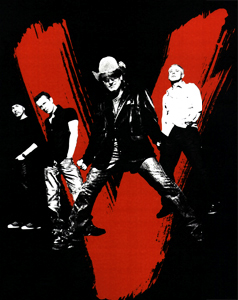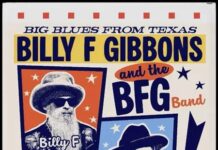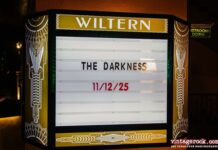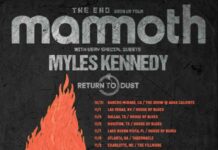As I peered out over a sea of cell phones glowing up the Arrowhead Pond like Bic lighters from a time not so long ago, I suddenly realized U2 is probably the last great band of the rock era. Hardcore purists who think they ran out on their punk roots the minute they came to America probably detest the fact that U2 is now an icon to millions the world over; a legend on par with the Beatles, Stones, Led Zeppelin and Pink Floyd; a distinguished member of the Rock and Roll Hall of Fame; an award-winning, 25-year-old Irish-bred quartet with a conscience and all of its original members; and the hottest concert ticket thus far in 2005.
Perhaps the logic goes that U2 should have stayed on the straight and narrow, and slogged away their days in the backstreets of Dublin. But then we wouldn’t have had the chance to see the evolution of Ireland’s most coveted sons. Bono wouldn’t have had the opportunity to step up to the podium, meet and greet dignitaries from every continent on earth, and almost single-handedly save the world from its own embroiled, narcissistic self. If anything, we should all be thankful U2 sold out (if that’s what you want to call it) and ingratiated themselves within the mainstream.
All Roads Lead to Dublin
My introduction to U2 came in the early 80s when I heard their debut single “I Will Follow” on the radio. I recall not thinking much of it at the time because it sounded like most of the other rubbish the slicked-up new wavers at KROQ were spinning in an effort to kick off the whole MTV generation. Thanks for that!
But then a couple of impervious items came along to stir my interest in the band. I picked up War, their third album, and I watched their performance at the US Festival on television. Back then, Bono wasn’t the pontificating spokesman and political activist he is today (well, not entirely); rather, he was a swaggering and rambunctious rock and roll front man whose penchant for climbing the stage scaffolding and waving white flags must have given his management (and life insurers) a near heart attack. Unlike other aspiring pop stars from the early 80s, U2 lived by their convictions, imparted their spiritual beliefs, and sliced it up with a bolstering edge and unbreakable backbeat. Eventually, I even learned to appreciate “I Will Follow.”
My curiosity in U2 elevated substantially when they released three pivotal records between 1983 and 1985. First came Under A Blood Red Sky Wide, an eight-song mini LP consisting of performances from Colorado and Germany that reaffirmed the Irish band’s rising status as an exhilarating live act. Next was The Unforgettable Fire, the group’s fourth album. Co-produced by Brian Eno and Daniel Lanois, the record was a turning point for U2. It gravitated on a torrential sonic subterfuge generated by Bono’s bigger-than-life presence, Edge’s multi-layered guitars, Adam Clayton’s thumping bass lines and the ever steady hand-to-eye stick work of Larry Mullen, Jr. While the music percolated and probed, Bono’s lyrics also took shape, exploring and questioning issues like drug abuse, faith, redemption and pretty much all of mankind. Wide Awake In America, the third record in so many years, was released primarily to sustain the excitement of The Unforgettable Fire. It boils down to an odd mix of two studio leftovers and two live tracks, but it was cheap and I quickly added it to my growing U2 collection.
Capped off with their monumental appearance at Live Aid, U2 in the mid 80s stood at the apex of old and new, destined to become the next big thing, whatever the hell that is. As if on cue, their subsequent maneuverings were executed with patience, contemplation, and utter brilliance. And they would never look back.
The day The Joshua Tree hit the record store shelves, I went into my local Wherehouse and bought the cassette. Realizing its limitations even then, I bought the CD a week later. U2 had risen to the challenge and produced a riveting collection, each song distinctive in its own flavor, theme, and ambience. “Where The Streets Have No Name” climbed and swooned like a sleeping epic, “With Or Without You” and “I Still Haven’t Found What I’m Looking For” unfurled strong and assertive choruses, and “Bullet The Blue Sky” catapulted a passionate fire in Bono’s belly that would resound in intensity as the band became more popular.

And popular they became. In 1987, U2 made the cover of both Time and Rolling Stone. The Joshua Tree won a Grammy for Album of the Year. Following suit, their concerts were instant sell-outs. I was able to snag a couple of tickets directly behind the stage for one evening during a five-night run at the Los Angeles Sports Arena. Not only was the company extraordinary — thanks Susie, wherever you are — but the performance was like a reawakening. I immediately recognized the charisma that radiates from Bono. The audience — even us sitting behind him -– was like putty in his hands. At one point, a guy jumped on stage and Bono just handed him a guitar and encouraged him to wail for a minute or two. At any other show I had seen up to this point, that same guy would have been turned into mince meat. On that point alone, U2 could be seen as being a little more interactive and fanatic-friendly, a trait that would serve them well into the future.
Just as everyone was led to believe the whole U2 machine would suddenly come to grinding halt at the end of The Joshua Tree mania, Rattle And Hum came moseying out of a dark corner. Presented in a similar tradition of the mini LPs and EPs of the past, the record was a mish-mash of B side-like leftovers and knock-offs, nifty collaborations, stylistic experiments, and the ever reliable live cuts. The feature film of the same name was a calculating documentary that followed the group through America. Inevitably, between the strange encounters and tourist stops, U2 explode on screen during the concert sequences. It also brought to close a decade in which four scruffy Irishmen became a contender for the crown of “biggest band in the world.” But a funny thing happened on the way to the throne. The 90s began on a strange note and popular music started to gurgle and dislodge. In the chaos and confusion that followed, it was difficult to assess where exactly U2 would fit in.
Obviously the band had a lot of options available to them. They could call it a day and retire with dignity and grace. They could try to make The Joshua Tree II in this age of sequels and sell a few million records to an unsuspecting public. Or they could do exactly what they did: lie low for a couple years and out of nowhere, wallop the flock with a left hook. Unpredictable, course, distorted, suffused with funky jungle and Middle Eastern rhythms, electronic farts, and a whole lot of huffing and puffing – that’s what Achtung Baby amounted to, put forth in a truly languid and pensive manner that made it possibly their best work ever. What’s more, the live spectacle they slapped together and called ZOO TV balanced on the wings of pure goofiness and multimedia innovation. So when Bono and company came rolling into the Jack Murphy Stadium on a cool November night in 1992, I was only too glad to sit five rows back and greet them with a raised fist and a Bic lighter. For the next two hours, I could barely contain myself as television screens flashed on and off, lights popped, cranes maneuvered in place, and the band was locked in a virtual battle to contain the music and the media without losing their audience.

For the remainder of the 90s, U2 traversed the line by engaging into some eccentric detours that almost cost them their reign. In 1993, they rushed out with Zooropa, a noble attempt to pick up from where Achtung Baby left off, but missing its mark by miles. The novelty of “Numb” (with The Edge handling lead vocals) quickly wore off, and followers and foes of U2 were starting to wonder if Bono was going to permanently morph into his self-created alter ego MacPhisto, a demon-like cabaret character with a screw loose. Most likely, it was an inside joke that went over a lot of fans’ heads. Even so, Bono could get as weird as he wanted and people were going to worship him. He has that kind of presence.
U2 passed over America when it came to promoting Zooropa, but they returned big-time behind their next opus, a cute little record they called Pop. And while the jury is still out as to whether this record cuts the mustard, I found myself purchasing tickets to the fabled Pop Mart stop in San Diego, this time three rows outside of the newly ordained sphere, a sophisticated catwalk that surrounds the front section of the floor and is alloted for the crazies. The rest of us mortals would have to contend on sitting on the outside and looking in. Like ZOO TV, Pop Mart was pure theater of the absurd. I remember Rage Against The Machine was a pretty intense opening act. I also remember the four members of U2 descending onto the lip of the runway in a giant lemon, about 25 feet from my face. They played about three or four numbers. Yeah, you never forget a thing like that.
The whole getup was probably too big for its own good. U2 was starting to become a parody of sorts. And you knew the band, especially Bono, was keenly aware of it. I was patiently waiting for the punch line, even after The Edge attempted to lead the crowd in a sing-along of “Daydream Believer.” In the end, it really didn’t matter because U2, for the most part, played a solid set. Still, in retrospect, I was far more entranced by the dazzle of ZOO TV. In fact, I resorted to putting Zooropa and Pop at the bottom of the stack. And as much as I had enjoyed U2, I’d pretty much written them off by the end of the 90s. In my mind, they would be the last great band of the 20th century. Beyond that, I had no idea of what they were capable of.
U2 for the New Millennium

Of course, the ever resourceful U2 reinvented themselves for the 21st century. And for the first time since 1987, I missed them not once, but twice, when they rolled through Southern California in 2001 (Note: I also missed them during the second leg of The Joshua Tree tour, but because I have since acquired a DVD from one of the two shows they performed at the L.A Coliseum, I feel like I was there). I didn’t even buy the new album, All That You Can’t Leave Behind, until after I heard it. It’s surprisingly sprite, as lively as much of their music from the 80s. And as I watched them perform on a CBS special one night, I started thinking I’d made a big mistake by not going to see them. I wouldn’t make that mistake again.
In late 2004, I heard How To Dismantle An Atomic Bomb and there was no question in my mind that I would be seeing U2 again. Concert dates were announced, and I responded efficently and scored a couple of prime tickets to the second show at the Arrowhead Pond. It would be the fourth show of the Vertigo tour. After the April 1st show sold out in less than five minutes, I was on deck on Ticketmaster’s Web site for the newly added April 2 show. I wasn’t interested in slugging it out with the hardcores and youngsters vying for a piece of Bono’s pant leg in the pit. I just wanted a nice vantage point where I could relax and appreciate the show from afar.
I ended up getting seats right next to the stage, which offers a unique perspective. Not only do you see everything that takes place directly on stage, you see some of what takes place behind the stage; and you get to see the entire floor full of fun folk leaping about with the joy and exhilaration of standing inches away from U2. The only visual I was deprived off was the full effect of the backdrops, which I later found out were obliging. Nevertheless, the band has minimized the over-the-top production costs, while giving smart, white-knuckle performances built on sweat and spiritual revivalism. And I was prepared to eat up every note.
So there appeared Larry Mullen, Jr. on the north lip of the sphere, beating on a makeshift drum set. Bono stood nearby stirring up the crowd by simply being there. The Edge and Adam Clayton held firm on the main stage. The arena was electric and exploding with excitement. For one somber moment, I felt like this was the very best place to be in the mighty OC, maybe the whole world. Opening with “Love And Peace Or Else” and “Vertigo,” two numbers from the new record, most definately started things off on a high note. A rousing “Elevation” pretty much sealed the deal.
From there, the momentary dips during the group’s lengthy foray into songs from their debut album Boy didn’t seem to deter the overall impact the band was having on the audience (yeah, I could go on about how the ignorant most modern-day U2 fans are of the early days, but what’s the point?). From where I sat, the maniacs on the floor were fairly rabid and combustible throughout. When the time was right, they pogoed up and down in perfect unison. They hoisted a 21-gun salute of camera phones and signs and out-stretched hands every time Bono, The Edge or Clayton walked the length of the sphere. At one point, Bono helped a little girl from the masses on to the stage. Together, they took a leisurely lap around the lighted sphere. Young Devin as she was apparently called tightly gripped the singer’s hand and waved to the crowd like a floating queen in a parade. As cute and downright darling as this sounds, I would have preferred to see the punked-up ragdoll from the previous night. But what are you going to do? The fact that Bono randomly plucks various individuals up from the bilious, surging throng before him shows a lot of courage no matter how you slice it.

Inevitably, Bono had a lot to say about various subjects near and dear to his heart. On this, the day that Pope John Paul II had passed away, Bono offered words of reverence, recalling a face-to- face meeting he had with the mighty patriarch and “champion of human freedom.” He coyly pulled out a Rosary the Pope had given him and displayed it before the crowd. Then Bono mildly imitated the face the Pope made when he handed him his infamous Wayfarer “Fly” wraparounds in exchange. Elsewhere, the singer dropped in plenty of raps about Africa (along with plenty of supporting video). Thankfully, he is a master at weaving his rants in tightly with the music, so it never becomes too much of a burden. A lot of people think it’s all part of the act. In all actuality, it’s the heart and soul of Bono’s indelible persona.
At one point during a “New Year’s Day,” “Sunday Bloody Sunday,” “Bullet The Blue Sky/The Hands That Built America” and “Running To Stand Still,” marathon, Bono blindfolded himself and dropped to his knees, seemingly signifying the plight of international terrorism, or perhaps on a more universal scale — decrying the general state of humanity. Only the singer knows for sure.
Finishing off the set with “Zoo Station,” “The Fly” and “Mysterious Ways” — all from Achtung Baby — the band took a short break and quickly returned to a gleeful banshee of cries and woo-hoos (they didn’t play an encore the night before). Out came a spanking dose of “Pride (In The Name Of Love)” that would have made Martin Luther King proud. Next came the intense sensory of “Where The Streets Have No Name,” a song that clearly defines the infectious power and motor skills of U2.
A marginal reading of “One” segued smoothly into “All Because Of You,” another new one that fits perfectly into the set. From there, the members of U2 wound down, playing a somber “Yahweh” and closing up with a traditional finale from War called “ 40.” The Edge and Clayton swapped instruments for a few bars, and eventually each man exited the stage, one by one. Mullen kept drumming for a solid minute or so. Suddenly, he stopped, stood, and bowed before descending the spiral stairway behind his kit. U2’s fourth concert of the 2005 Vertigo tour was one for the history books. Whether it will go down as a stellar performance remains to be seen. As the tour progresses, the sets will inevitably get tighter, special guests will show up, and other songs will be added on to the list. Even though I personally would have appreciated a little “Bad” or “In God’s Country,” the choice of songs within the whole show are all incredibly well paced and executed. Invariably, U2 makes it look pretty easy.
I searched over a crowd that was hoping and praying for another encore and recognized a sense of devotion that is scarce for many of the other big rock bands of the last 25 or 35 years. The Rolling Stones are pegged to return later this year and they will undoubtedly have no trouble selling out stadiums and arenas in their usual manner. One can only dream they will record a decent album to build the tour around. But the reality of the situation is they don’t have to because of the comfort zone they and others like Paul McCartney exist in. The legend is so vast, they can continue to make awful records and still sell out concerts.
The Who (or what’s left of the Who) is a functioning entity, but at what capacity I’m not willing to speculate. Other early 80s groups like the Pretenders and R.E.M. are chugging away, etching out a living on the road and enjoying modest record sales. Bruce Springsteen and Neil Young are two other longtime survivors who continue to do pretty decent business.
But U2 stands apart from all of them. It’s not as easy as saying they are one of the few bands that sells records and concert tickets. However, it may be as simple as saying they continue to make music that matters, while their following is faithful and large. It probably didn’t hurt too much when U2 agreed to play “Vertigo” in an iPod commercial. They’re not showing their age like other bands from their era. Plus their demographic seems to expand with each album and tour. For the time being, I guess U2 isn’t only the last great band of the rock era; they’re probably the biggest band on the whole friggin’ planet, 25 years later. Who knows, maybe Bono will save the world!
I thought about that for a minute or two as I followed the cell phone lights out of the arena and into a waiting shuttle bus ride back to reality.





















